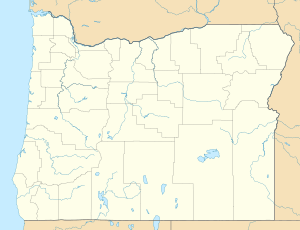Rattlesnake Creek (Oregon) facts for kids
Quick facts for kids Rattlesnake Creek |
|
|---|---|
|
Location of the mouth of Rattlesnake Creek in Oregon
|
|
| Country | United States |
| State | Oregon |
| County | Malheur |
| Physical characteristics | |
| Main source | near McDermitt 6,439 ft (1,963 m) 42°16′55″N 117°40′10″W / 42.28194°N 117.66944°W |
| River mouth | Crooked Creek near Burns Junction 3,770 ft (1,150 m) 42°43′24″N 117°47′42″W / 42.72333°N 117.79500°W |
| Length | 57 mi (92 km) |
| Basin features | |
| Basin size | 298 sq mi (770 km2) |
Rattlesnake Creek is a stream in the state of Oregon, United States. It is about 57 miles (92 kilometers) long. This creek is a tributary, which means it flows into a larger stream. Rattlesnake Creek joins Crooked Creek.
The creek starts in the desert. This area is north of a place called McDermitt. It is located in Malheur County.
Contents
What is an Intermittent Stream?
Rattlesnake Creek is known as an intermittent stream. This means it does not always have water flowing in it. During dry seasons, or times with little rain, parts of the creek can dry up completely. Water only flows when there has been enough rain or snowmelt.
Why Do Streams Dry Up?
Streams like Rattlesnake Creek often dry up because of the climate. Desert areas get very little rainfall. The ground also absorbs water quickly. High temperatures can make water evaporate fast. This makes it hard for water to stay in the creek all year.
The Journey of Rattlesnake Creek
Rattlesnake Creek begins in the desert. It flows through Malheur County. The creek's journey takes it through a mostly wild and open landscape.
Where Does the Creek End?
The creek eventually meets Crooked Creek. This meeting point is near a place called Burns Junction. Burns Junction is where two highways, U.S. Route 95 and Oregon Route 78, cross paths. From there, Crooked Creek flows on to join the Owyhee River.
Wildlife Around the Creek
Even though Rattlesnake Creek can be dry sometimes, it still supports life. When water is present, it provides a habitat for plants and animals. Many desert creatures rely on these water sources.
Desert Animals and Plants
Animals like rattlesnakes, coyotes, and various birds might visit the creek. They come to drink water or find food. Tough desert plants, such as sagebrush and grasses, grow along its banks. These plants can survive long periods without much water.
 | Delilah Pierce |
 | Gordon Parks |
 | Augusta Savage |
 | Charles Ethan Porter |


